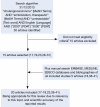Trans-arterial embolisation therapies for unresectable intrahepatic cholangiocarcinoma: a systematic review
- PMID: 26487951
- PMCID: PMC4570915
- DOI: 10.3978/j.issn.2078-6891.2015.055
Trans-arterial embolisation therapies for unresectable intrahepatic cholangiocarcinoma: a systematic review
Abstract
Background: Unresectable intrahepatic cholangiocarcinoma (ICC) portends a poor prognosis despite standard systemic treatments which confer minimal survival benefits and significant adverse effects. This study aimed to assess clinical outcomes, complications and prognostic factors of TAE therapies using chemotherapeutic agents or radiation.
Methods: A literature search and article acquisition was conducted on PubMed (MEDLINE), OVID (MEDLINE) and EBSCOhost (EMBASE). Original articles published after January 2000 on trans-arterial therapies for unresectable ICC were selected using strict eligibility criteria. Radiological response, overall survival, progression-free survival, safety profile, and prognostic factors for overall survival were assessed. Quality appraisal and data tabulation were performed using pre-determined forms. Results were synthesized by narrative review and quantitative analysis.
Results: Twenty articles were included (n=929 patients). Thirty three percent of patients presented with extrahepatic metastases. After treatment, the average rate of complete and partial radiological response was 10% and 22.2%, respectively. Overall median survival time was 12.4 months with a median 30-day mortality and 1-year survival rate of 0.6% and 53%, respectively. Acute treatment toxicity (within 30 days) was reported in 34.9% of patients, of which 64.3% were mild to moderate in severity. The most common clinical toxicities were abdominal pain, nausea and vomiting, and fatigue. Multiplicity, localization and vascularity of the tumor may predict worse overall survival.
Conclusions: Trans-arterial therapies are safe and effective treatment options which should be considered routinely for unresectable ICC. Consistent and standardized methodology and data collection is required to facilitate a meta-analysis. Randomized controlled trials will be valuable in the future.
Keywords: Intrahepatic cholangiocarcinoma (ICC); embolization; survival; unresectable.
Conflict of interest statement
Figures

References
-
- Khan SA, Thomas HC, Davidson BR, et al. Cholangiocarcinoma. Lancet 2005;366:1303-14. - PubMed
-
- Chou FF, Sheen-Chen SM, Chen YS, et al. Surgical treatment of cholangiocarcinoma. Hepatogastroenterology 1997;44:760-5. - PubMed
-
- Anderson CD, Pinson CW, Berlin J, et al. Chari RS. Diagnosis and treatment of cholangiocarcinoma. Oncologist 2004;9:43-57. - PubMed
-
- Hong K, Geschwind JF. Locoregional intra-arterial therapies for unresectable intrahepatic cholangiocarcinoma. Semin Oncol 2010;37:110-7. - PubMed
Publication types
LinkOut - more resources
Full Text Sources
Medical
